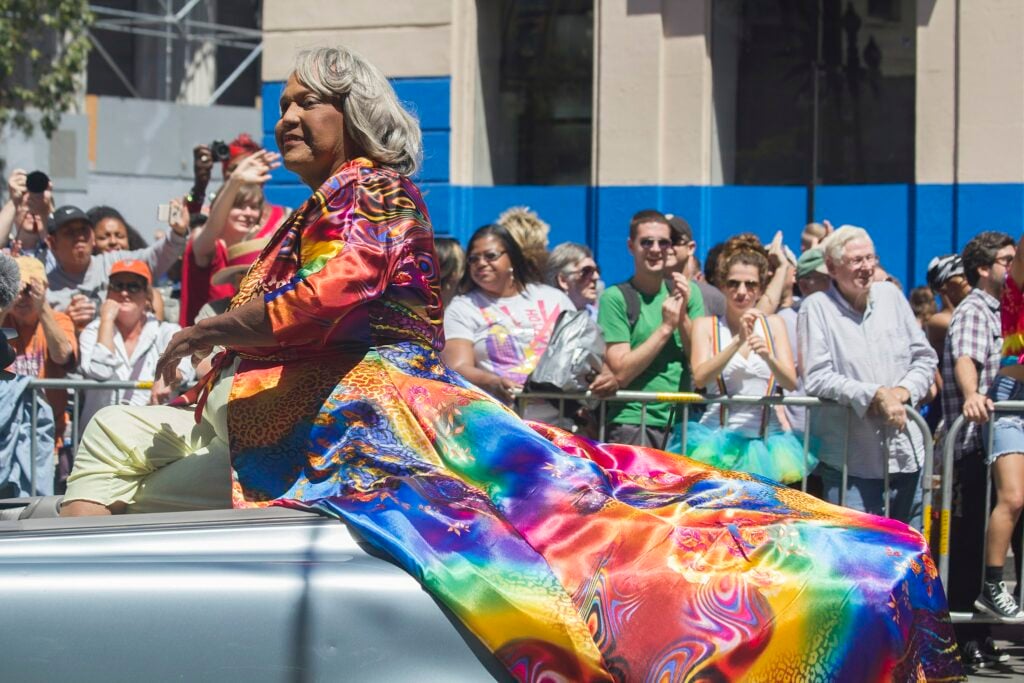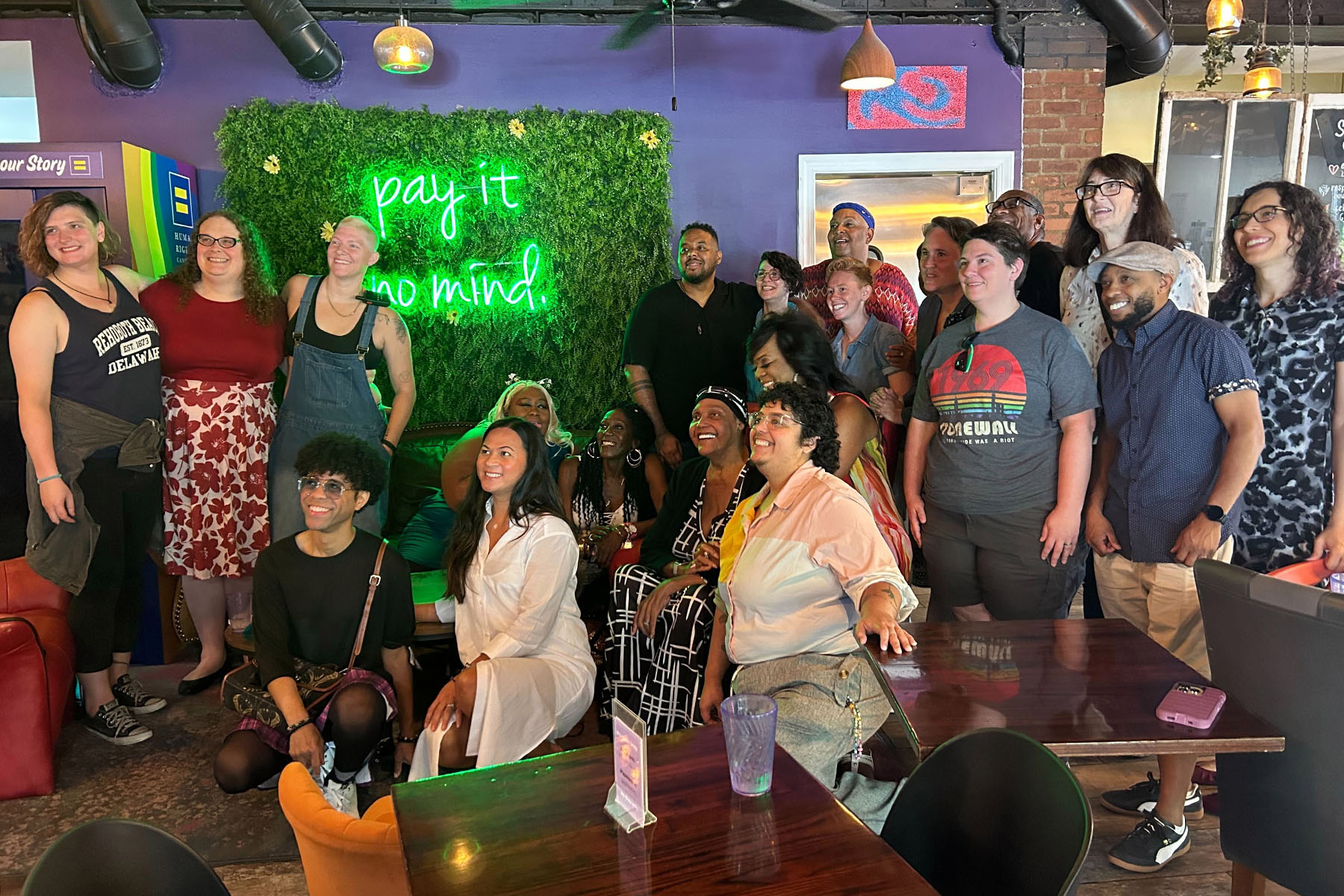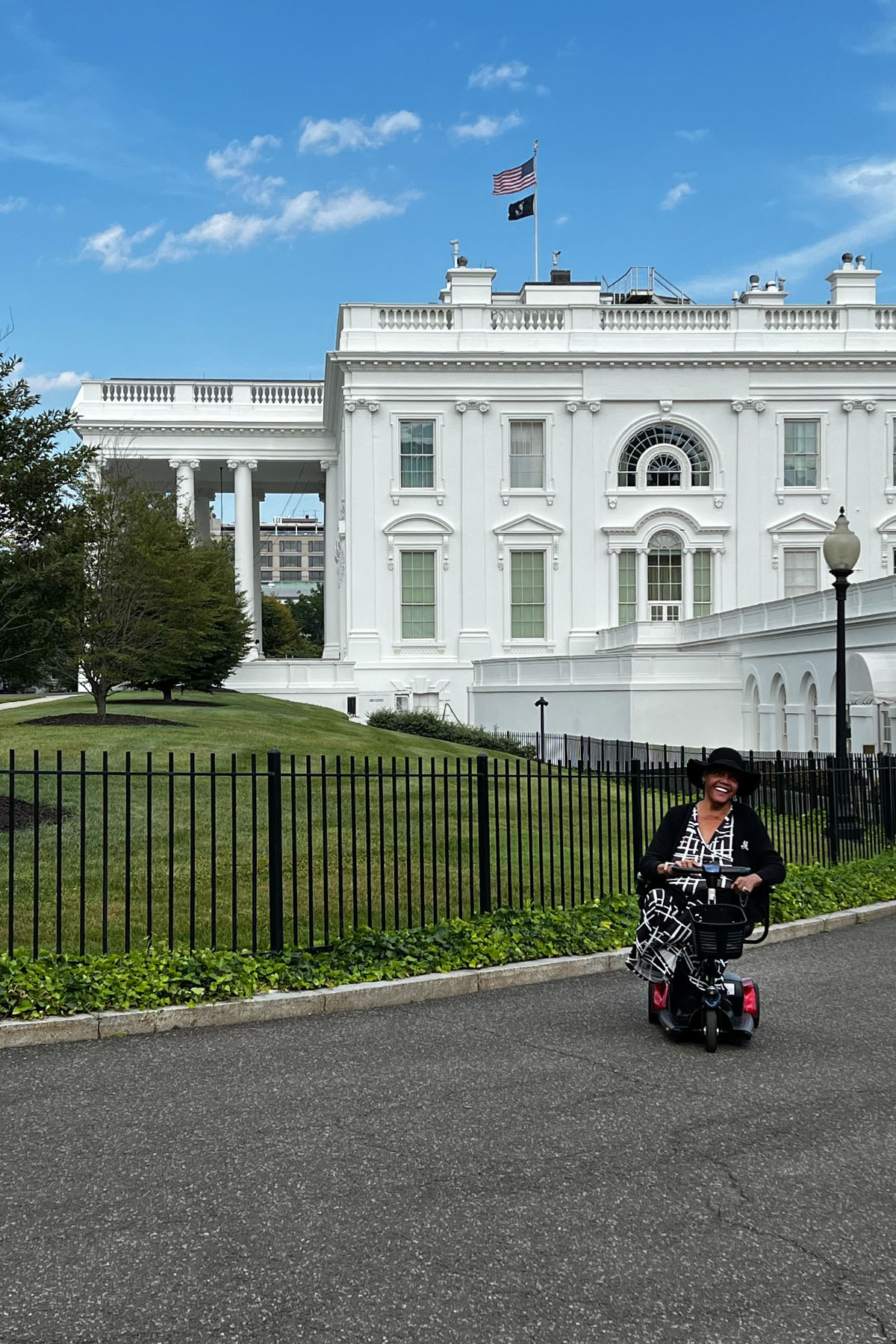Stonewall veteran Miss Major is on the road, urging trans people to ‘stand up and fight’


Originally published by The 19th
We’re telling the untold stories of women, women of color and LGBTQ+ people. Sign up for our daily newsletter.
Miss Major Griffin-Gracy wants to light a fire that calls transgender people to action. Now over 80 years old, the legendary trans activist has left Little Rock, Arkansas, her adopted hometown, to spread the word with trans people in New York City, Washington, D.C., and beyond: They need to wake up, stand up and realize just how perilous the current political moment is.
As a rule, Miss Major hates traveling. She relies on motorized scooters or wheelchairs to get around, and the journey has already taken a toll. She took an Uber from Baltimore to New York City because of a diverted flight, and had to sit waiting in a bathroom stall for 20 minutes while her assistant found a wheelchair, when no other accommodations or help could be found at an Amtrak station on the way to Washington. But still, she pressed on.
“It’s just the beginning,” she told The 19th during an interview in her Washington hotel room. For her, the message that she needs to share is more important than the journey it will take to tell it.
Seventy-seven anti-LGBTQ+ bills have passed into law this year, according to the American Civil Liberties Union. She doesn’t remember which one fueled her decision in late June to leave home, but she knows that she couldn’t take it anymore.
“I said, ‘Oh God, another law, they’re out to get us.’ And I went to bed, I couldn’t sleep. I got up. I walked around the house, I sat down. And I said, ‘Well, this has fucked up my Fourth of July,’” she said. “And that’s when I decided, well, someone’s got to do something. And then it dawned on me, well, no one’s going to do it but me.”
On Thursday, she met with transgender community figures and activists in Washington on the second leg of her tour. The group conversation, and rare intimate gathering with Miss Major, took place at As You Are, a local queer bar. She sat underneath the bar’s tribute to Marsha P. Johnson, whose constant refrain is captured in glowing green neon on the wall: “Pay It No Mind.”
As she spoke, Black transgender women from her own generation looked on, as did young trans activists dressed down for a scorching summer day. The bar’s owners — local fixtures in queer D.C. who have hosted most drag performers in the city as well as Secretary of Transportation Pete Buttigieg — had brought everyone in soon after opening for the day.
“We have the nerve to drive the conversation … when we’re somewhere, we change that space forever,” she told them. “Just walk in and you change it, just by being there. And you will.”
Miss Major fought back at the 1969 Stonewall uprising in New York City, at another gay bar in a different time. She wants people to know: That history is not far away. She sees efforts to restrict trans rights in the states, as well as rollbacks of LGBTQ+ rights nationwide as seen in the Supreme Court ruling in 303 Creative LLC v. Elenis, as part of a greater effort to force transgender people back into the 1950s.
“I’m not going back,” she told The 19th. “These kids don’t know what it was like then, what we had to go through, how we had to fight. Somebody’s gotta light a fire under their ass and get them up and going.” She urged those gathered on Thursday to unite and take care of each other, to have each other’s backs in the face of growing violence — because, she said, in the end, nobody else will.

(Orion Rummler for The 19th)
“Don’t be complacent now,” she told the group. “Don’t step back and be in the shadows … you’ve got to do it. You’ve got to, because I can’t do it alone. And I decided to come around and let you know, you’ve got to stand up and you’ve got to move on this. We can’t afford to not move.”
The largest share of anti-LGBTQ+ laws passed this year aim to ban gender-affirming care for trans youth and restrict how LGBTQ+ subjects are taught in schools. Republicans in Congress have pushed the same legislation, although it currently can’t pass a Democrat-controlled Senate. In Florida, transgender adults face mounting health care restrictions.
Violence against transgender people and shootings targeting LGBTQ+ spaces have been on the rise, and ahead of the 2024 presidential election, most major Republican candidates have explicitly endorsed anti-LGBTQ+ views.
Many transgender people across the country are living in a culture of fear — worried about access to health care and whether they will be safe in a time of rising anti-trans political rhetoric. But they cannot stay behind the scenes and hide, Miss Major urged. They have to join together.
After Miss Major spoke to the crowd at the bar, a line formed to talk with her. Most knelt to speak on eye-level with her from where she sat, and she clasped their hands. For a few, it was a reunion — they had met her once before, or she had given them advice, mentorship. For others, this was their chance to meet one of the giants of transgender history, a woman that so many feel like they stand on the shoulders of.
This was that opportunity for SaVanna Wanzer, who has been working to support trans people around D.C. for decades. Wanzer, a 61-year-old Black trans woman, is a prominent trans elder in her own right. She founded Capital Trans Pride in D.C. — a response to the capital city’s gay Pride celebrations that aims to educate and empower trans people.
“This was a special moment for me to meet royalty. Trans royalty. That’s what it is,” she said.
Bahsha Glass, another Black trans woman in her 60s in the crowd, said she felt overjoyed to be part of the moment — and to take away some of Miss Major’s experience, and her hope.
“I think that her visit here, at least to me, it just means so much because of what the transgender community is going through,” she said. “I look around and I see, as a Black transgender woman, I just see so many doors being closed. Doors that had been opened, being closed. It doesn’t make sense. It’s not fair,” Glass said.
What especially infuriates her is watching school shootings continue to rise — and that politicians would rather spend time legislating the rights of LGBTQ+ people than to address gun violence. That is an emergency that actually needs to be addressed, she said, not kids being read to by drag queens or what transgender people are doing.
Gabrielle Thomas understood what Miss Major meant by her call against complacency, especially for the younger generation — who, thanks to sacrifices made by their elders, have had more opportunities to be themselves, to live their lives and may not know how bad things can truly get.
“I don’t think they’re complacent in the fight. I think that they don’t see the fight,” she said. The younger generation is in some ways naive to the rights that people want to take away from them, because they’ve always had them — but the more that they learn about what’s happening, she believes that more trans people will come together to act.
“I think when more people like Miss Major come out and talk about things that happened to them in the past and show them what it was like in the past, then I think that more of the young people will be able to know the possibilities of the things that could happen, if we allow them to do this,” she said.
Thomas, a 66-year-old Black trans woman, is the director of Shugg’s Place in Washington, which connects trans and gender-nonconforming people to job coaching and social services. She said she felt totally seen by Miss Major as they met, as if she were connected with someone who shared her same vision about life and experiences.
Miss Major wants everyone who joined her at As You Are to take the message with them to their other trans friends, to motivate each other.
“I want them to take it from there and tell somebody that they’re with, tell another trans person, that it’s time to stop moping about this stuff, and don’t hide this time. We’ve got to stand up and fight,” she said.
Miss Major took her vision to the White House on Thursday, in a sit-down meeting with Hannah Bristol, senior advisor for the office of public management, and Jamie Keene, deputy director of racial and economic justice. She sat with them for about an hour and a half. At the meeting, organized by the National Center for Transgender Equality, she told them about how transgender people are hurting, trans women are being killed, and action needs to be taken.

(Devon Ojeda/NCTE)
“I told them that they have to do something. And so they listed what they’re doing and stuff like that, and they can’t concentrate on us per se, trans people. They have to generalize stuff, which I don’t believe,” she said.
The White House perspective was that it is difficult to target resources for a specific group as they’re building programs for LGBTQ+ people, especially since doing so can incur backlash from the administration’s political opposition, said Devon Ojeda, senior national organizer for the National Center for Transgender Equality, who also attended the White House meeting.
Ojeda said they understand that view, since they are familiar with the kind of hateful rhetoric that is reserved for organizations fighting for transgender rights — and knows that it creates a target. But the White House needs to listen to more trans-led organizations, not just those serving the LGBTQ+ community as a whole, they said.
“Quite frankly, President Biden and the Biden administration has been the most progressive in terms of trans rights, historically. I just think there’s a lot that is going on, a lot of chaos that is happening,” they said. “We’re trying to get them to listen more.”
The White House officials sought insights from Miss Major on how they can reach more trans people to share resources and information from the administration, said Ojeda, who organized Miss Major’s appearance at the As You Are bar. They wanted to know how they could work together.
This was Miss Major’s third visit to the White House.
“It’s just another building” full of people that don’t care about trans people, she said — and that have to be convinced to care.
Once she leaves Washington, her next stop is going back to Little Rock to get some rest. Then, she’s off to the next city — although she doesn’t know where, yet. In her hotel room, with her shoes off, the last of her to-go dinner on the table and a bouquet of flowers from New York draped on a side table, she reflected that she had started her whirlwind tour on a whim, and that she needs to come up with a more detailed plan.
She knows that young trans people have the power to lead themselves. But they have to want to do it. And when it was her on the streets, and her fighting back at Stonewall, there was nobody there telling her what to do. She had to realize her own power. And the trans youth of today have to realize their own power, too — because it can be easily taken away.
As she discusses in her book, for Black transgender women, it’s as if Stonewall never happened. It didn’t set the scales right for them, or undo the inequities that still hold them back today.
“It didn’t do nothing for me. Didn’t help me at all. And then my friends started dying,” she said. Keeping their memories alive gets tiring, she said, because there are so many to remember. First you forget their face, then you forget how they sound, then you lose what they smelled like.
“That’s what they do. They take and take and take. So we gotta stop them. Got to.”
Quinn Dombrowski, CC BY-SA 2.0 , via Wikimedia Commons




